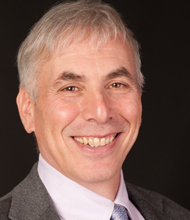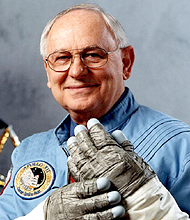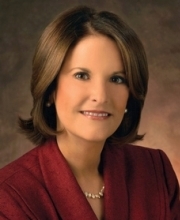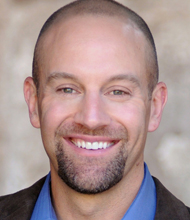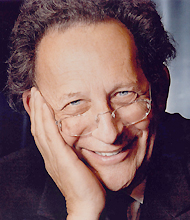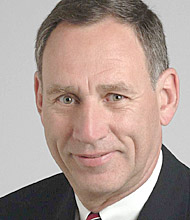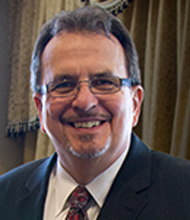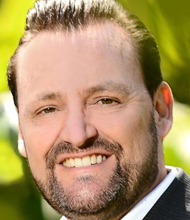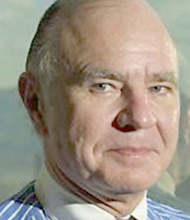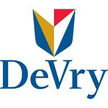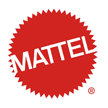| TRAVELS FROM |
|
SPEAKING FEE RANGE ** Please note that while this speaker’s specific speaking fee falls within the range posted above (for Continental U.S. based events), fees are subject to change. For current fee information or international event fees (which are generally 50-75% more than U.S based event fees), please contact us. $20,000 to $25,000 |
|
BOOK MICHAEL GELB speakers@coreagency.com |
| TRAVELS FROM |
|
SPEAKING FEE RANGE* $20,000 to $25,000 |
|
Book Michael Gelb speakers@coreagency.com |
- A pioneer in applying “genius thinking” to creative thought, executive coaching, and leadership innovation.
- Author of 14 books, including the bestselling How to Think Like Leonardo da Vinci: 7 Steps to Genius Every Day.
- Co-director of the Leading Innovation Seminar at the University of Virginia’s Darden Graduate School of Business.
Michael Gelb is a prolific author and one of the world’s most respected authorities in the fields of personal and organizational development. A pioneer in applying “genius thinking” to creative thought, executive coaching, and leadership innovation, Gelb has over 30 years of experience speaking, leading seminars, and coaching business executives to embrace his distinctive approach toward fostering success.
Gelb is co-director of the Leading Innovation Seminar at the University of Virginia’s Darden Graduate School of Business. He is also a faculty member of the Institute for Management Studies. His clients are counted among some of the world’s leading businesses, including DuPont, Genentech, Microsoft, and Nike.
Gelb’s 14 books include the bestselling title How to Think Like Leonardo da Vinci: 7 Steps to Genius Every Day, Creativity on Demand, Innovate Like Edison, Discover Your Genius, and Thinking for a Change. Translated into 25 languages, Gelb’s books have sold over a million copies. His work has been featured in the New York Times, the Washington Post, and on NPR and the BBC World Service, among other major outlets.
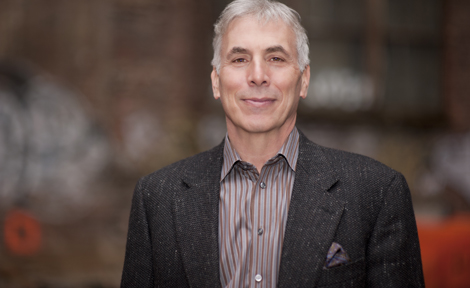 I want [my audiences] to understand that they are more creative than they may have previously imagined. I want [my audiences] to understand that they are more creative than they may have previously imagined. | |
| |
 | What do you want people to learn / take away from your presentations? |
 | I want them to understand that they are more creative than they may have previously imagined. I want to see them smile and have a light go “ON” in their eyes. And I want them to take away practical skills that will help solve their most important business problems. |
 | How do you prepare for your speaking engagements? |
 | My life is preparation. My speaking is a reflection of who I am. And I prepare for each engagement by tuning in to the client and focusing on achieving the results that are most important for them. |
 | Have you had any particularly memorable speaking engagements? |
 | Yes. Many! Among the most memorable:
• I spoke to a group of 1000 in Ankara for Turkish Innovation Week. The sponsors handed out my Edison book in Turkish as a gift. They invited high school and college students to attend and the enthusiasm of these young people is something I will always remember. • I followed His Holiness The Dalai Lama as a keynoter in Australia for an audience of 3,000. People asked if it was hard to follow such a powerful presence but actually it was one of my easiest engagements as the audience was already in Bliss when I began to speak. • I had the privilege of speaking to a group of company presidents at the Uffizi Gallery in Florence (They arranged for exclusive access). I spoke about How to Think Like Leonardo while standing in front of the Maestro’s paintings! |
 | What types of audiences would most benefit from your message? |
 | Over the years I’ve spoken to people from all walks of life and many different professions. And, my keynotes are especially popular with groups that are predominantly analytical: PhDs, engineers, financial analysts, MBAs. My presentations open their minds to the more imaginative and intuitive aspects of intelligence. |
 | Why would you recommend that clients use you as a speaker for their next event? |
 | Here are 10 reasons:
• Energy: Clients describe my energy as "scintillating," "inspiring," "electric," "charismatic," and "enlivening." • Originality: Learn from an original thinker and creator. • Authenticity: All keynotes are an expression of my lifetime interests. • Passion: My passion for inspiring your group will lead to a presentation that exceeds your expectations. • Global: I have spoken in more than 25 countries and have extensive experience working with multi-national and multi-cultural groups. • Relevance: After careful consultation I will focus my message on your most important organizational issues. • Humor: People learn better when they laugh and I inspire laughter in the most serious groups. • Results: I focus on achieving the results that are most important to you. I’m frequently invited to keynote the same conference in multiple years because people get real benefit from my presentations. |
 | Which of your keynote topics are the most popular? |
 | How to Think Like Leonardo da Vinci is my most popular program. It’s an expression of my unique study of Leonardo’s advice to his students and how that advice is relevant in our world. Innovate Like Edison is also very popular. Edison is the supreme role model for anyone who wants to profit from innovation. |
 | How much do case studies, personal stories and humor factor into your keynote speech content? |
 | Examples, stories and humor make a presentation engaging so I use them liberally. |
| If you want to innovate you need to have a critical mass of people who know how to think like innovators. | |
| |
 | How can people nurture independent thinking, creativity and innovation in the workplace? |
 | First, they need to learn the skills for thinking creatively. Then they must understand how to facilitate a culture of innovation. I call this: Innovation Literacy. If you want to innovate you need to have a critical mass of people who know how to think like innovators. It helps to have positive role models, so I use Leonardo da Vinci and Thomas Edison, among others. |
What Clients Say About Michael...
"We use Michael Gelb′s mind mapping for all our strategic planning... it works!"
Mary Damsma, Director Pension Fund Administration, Amoco Corporation
"For me personally, Michael Gelb′s approach to mind mapping is more powerful than the computer. It gives me a way to intermix creativity, logic and planning to make better use of what the computer can do."
Linda Schultz, Precess Re Engineering Expert, Hercules Corporation
"Inspiring and educational... Michael Gelb brings out the best in people. I recommend his program wholeheartedly."
Delano E. Lewis, President of National Public Radio
"It′s never been so easy for me to come up with incredible solutions and ideas. My entire family including my children now use Michael′s techniques."
Anne Callahan, Senior Product Manager, Nightngale-Conant-Corporation
Michael Gelb has a rare talent for distilling groundbreaking journeys into readily applicable steps toward success. With clarity of both insight and presentation, Gelb gives his audiences detailed road maps for becoming thinkers and innovators akin to history’s best examples of dynamic and groundbreaking genius.
Gelb has distilled the wisdom of Leonardo da Vinci into seven clearly defined themes. He’s consolidated inventor Thomas Edison’s talent for innovation into five steps that any business can use to generate success. Drawing upon lessons gleaned from a ten-person “dream team” of history’s most revolutionary minds, Gelb distills applicable “genius characteristics” that will help individuals and organizations focus upon their most important concerns.
In addition to lessons drawn from history, Gelb offers unique insight into the characteristics of transformational leadership and the opportunities we have to actually improve our brainpower as we age. Drawing upon the capacity of physical examples to develop new pathways of learning, he uses literal juggling to illustrate five keys to high performance “juggling in business and life.”
Gelb is willing to adapt any of his themes to an organization’s needs, offering presentations ranging from keynote addresses to multi-day workshops.
How to Think Like Leonardo da Vinci
Audience: Leaders, managers, professionals, people working in teams (special adaptations for trainers, engineers, financial services, marketers and salespeople)
Competencies: Creativity, accelerated-learning, leadership
Program formats: Keynote speech, half-day to two-day workshop
Based on the book How to Think Like Leonard da VinciThinking creatively, learning faster and leading change, these abilities are at a premium in a highly competitive global business environment. What if you could call on history’s greatest genius, Leonardo da Vinci, to be your personal mentor in cultivating these highly prized elements of human capital? Anatomist, architect, botanist, city planner, chef, humorist, engineer, equestrian, inventor, geographer, geologist, military scientist, musician, painter, philosopher and raconteur, Leonardo da Vinci (1452 – 1519) helped bring the Western world out of the Middle Ages and into the Renaissance. Now, as we move from the Bureaucratic/Industrial Age into the Information/Imagination Age, his approach to optimizing human potential is more relevant than ever.
This dynamic, highly-interactive program brings da Vinci’s genius to life through fascinating biographical and historical information, setting the stage for an introduction to seven principles for thinking “a la Leonardo.”
Participants are then guided to apply the principles, through a proven series of practical exercises, to your organization’s greatest challenges. Participants will learn how to:
- Think creatively.
- Cultivate independent thinking.
- Improve learning ability with age.
- Find opportunity in uncertainty.
- Improve memory and problem solving.
- Balance mind and body to reduce stress.
- Nurture creativity and innovation in the workplace.
Leonardo invented the parachute before anyone could fly! Imagine what your organization could accomplish with that kind of innovative thinking.
Innovate Like Edison
The 5-Step System for Breakthrough Business Success
Audience: Leaders, managers, professionals, people working on innovation teams
Competencies: Individual innovation literacy, cultivating an organizational culture that supports innovation
Program formats: keynote to three-day workshop
Leonardo was probably the most creative person who ever lived but Thomas Edison is history’s greatest practical innovator. Beyond his invention of the phonograph, motion pictures and a system to light the world, Thomas Edison invented the rigorous, disciplined process of innovation.
In addition to creating the world’s first Industrial Research and Development laboratory, Edison was also a master at promoting a culture of innovation. Moreover, he understood that the principles of personal success and organizational innovation go hand-in-hand. Personal success and fulfillment requires you to learn how to think like an innovator; and, for your organization to be successful, innovation is now more important than ever.
This program introduces Edison’s Five Competencies of Innovation™. They are:
- Solution-Centered Mindset
- Kaleidoscopic Thinking
- Full-Spectrum Engagement
- Master Mind Collaboration
- Super-Value Creation
Each competency will be brought to life with specific, practical “take-home” applications. This program is readily adaptable to specific organizational challenges. It can also be combined with “How to Think Like Leonardo Da Vinci” to focus on optimizing creativity AND innovation.
BRAIN POWER: Improve Your Mind as You Age
Audience: Anyone with a brain who is aging
Competencies: Creative longevity, memory improvement, wellness
Program formats: Keynote speech, half-day to three-day workshop
In the last 30 years the scientific evidence supporting the notion that your mind can improve through the years has become overwhelming. Clearly, the question is no longer whether your mind can improve with age, but rather how you can optimize your mental powers as you get older.
This program presents practical, evidence-based information on improving your mind throughout life. Most of us were raised with faulty ideas about our mental capacity – such as the notion that IQ is fixed at age 5, that brain cells degrade yearly after age 30, and that memory and learning ability inevitably decline with age.
These notions, based on the scientific understanding that was prevalent in the 1950s, are myths – dangerous myths that can stifle our ability to flourish in the second half of life.
Just as Copernicus overturned the myth that the earth was at the center of the universe, so contemporary neuroscience has revolutionized our understanding of the potential to improve mental functioning as we age.
In this compelling, inspirational and supremely practical program you’ll be presented with the evidence for this new paradigm and, most importantly, you will learn to incorporate this new way of understanding aging so you can improve your mind every year of your life.
Topics include:
- The New Paradigm: A Whole New Brain
- Think Counterclockwise: Adopting the Most Adaptive Attitudes
- Be a Life-Long Learner: How to Improve Your Memory and Learning Ability
- Exercise for More Brain Power: The Most Beneficial Activities
- Mind Your Diet to Nourish Your Mind: 7 Simple Elements of a Brain-Friendly Diet
- How to Create a Brain-Enhancing Environment
- Investing in Your Social Wealth: Cultivate Healthy Relationships (and Stay Sexy!)
- Sleep, Naps and Meditation: Rest Peacefully to Delay Resting in Peace
- Applied Neuroplasticity: The Brain That Changes Itself
Conscious Capitalism: The 8 Characteristics of Transformational Leaders
Audience: Leaders interested in Conscious Capitalism
Competencies: Transformational leadership
Program formats: Keynote speech, half-day to two-day workshop
The 8 Characteristics of Transformational Leaders are:
- Authenticity
- Passion
- Creativity
- Self Knowledge/Awareness
- Interpersonal Intelligence/Sensitivity
- Integrity
- Clarity of Purpose
- Global Awareness
Michael J. Gelb provides inspiring examples and practical guidance on how to cultivate these traits individually and organizationally.
Juggling in Business and Life: Five Keys to High Performance
Audience: Managers, professionals, people working in teams
Competencies: Accelerated learning, teamwork
Program formats: Keynote speech or half-day workshop
This program creates a fun, cooperative learning environment. Participants coach one another in the art of juggling, and pick up the balls for each other as they drop! In the process, everyone learns the core principles of accelerated learning and organizational high performance.
The ability to learn is life’s most important skill. This delightful program uses juggling as a metaphor for learning how to learn.
Participants will learn how to:
- Manage complexity and thrive on chaos by gracefully keeping a number of things “up in the air” at the same time.
- Approach mistakes creatively as you learn to “let the balls drop.”
- Use teamwork to create a cooperative learning environment.
- Learn anything you want to as well and as fast as you can.
- Apply the principles of accelerated learning to become a more effective coach for your colleagues, subordinates, family, and friends.
- Juggle!
Discover Your Genius
How to Think Like History’s Ten Most Revolutionary Minds
Audience: Leaders, managers, professionals, and employees working in teams
Competencies: Manage change, develop creative thinking skills, cultivate emotional intelligence, promote “learning organization”
Program formats: Keynote speech, half-day to two-day workshop
In this compelling, multi-media presentation you will have the opportunity to get to know ten of the most amazing people who have ever lived. Each of these extraordinary individuals embodies a special “Genius” characteristic that you will be invited to integrate into your daily life and apply to your most important organizational challenges. Each genius will be introduced through specially commissioned original watercolor portraits and a brief biography illustrating the role of the key principle in his or her life and work. You will then explore how that principle can and does relate to you and your organization.
The full Genius “Dream Team” includes:
- Plato (circa 428 – 348 BC): “Deepening your love of wisdom”
- Filippo Brunelleschi (1377 – 1446): “Expanding your perspective”
- Christopher Columbus (1451 – 1506): “Going perpendicular: Strengthening your optimism, vision and courage”
- Nicholas Copernicus (1473 – 1543): “Re-organizing your vision of the world”
- Queen Elizabeth I (1533 – 1603): “Wielding your power with balance and effectiveness”
- William Shakespeare (1564 – 1616): “Cultivating your emotional intelligence
- Thomas Jefferson (1743 – 1826): “Celebrating your freedom in the pursuit of happiness”
- Charles Darwin (1809 – 1882): “Developing your power of observation and cultivating an open mind”
- Mahatma Gandhi (1869 – 1948): “Applying the principles of spiritual genius to harmonize spirit, mind and body”
- Albert Einstein (1875 – 1955): “Unleashing your imagination and ‘combinatory play”
The “Genius Modules” are easily customized to focus on your most important concerns. A recent program for a global construction management group, for example, emphasized the life of Filippo Brunelleschi, the world’s first design-builder; while a program for a computer sales force emphasized Columbus’ optimism and Shakespeare’s “Emotional Intelligence.”
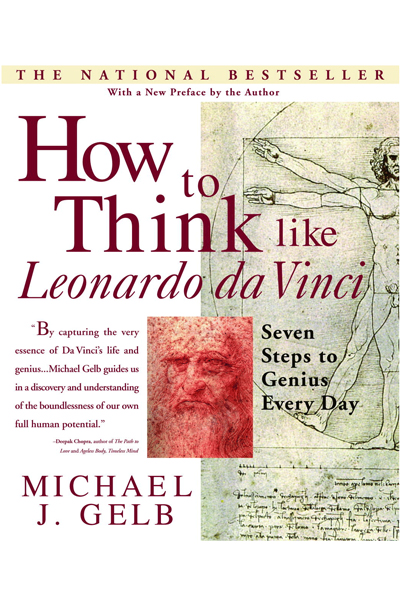
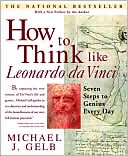 How to Think like Leonardo Da Vinci: Seven Steps to Genius Every Day
How to Think like Leonardo Da Vinci: Seven Steps to Genius Every Day
Michael Gelb′s How to Think Like Leonardo Da Vinci is an inspiring and inventive guide that teaches readers how to develop their full potential, using the principles of Da Vincian thought identified by the author.
Beginning with a brief historical biography of Da Vinci and an overview of the astounding advances made in the arts and sciences during the Renaissance, Gelb illustrates the seven fundamental elements of Da Vinci′s thought process:
- Questionare: A questing, insatiably curious approach to life
- Dimostrazione: A commitment to test knowledge through experience
- Sensazione: The continual refinement of the senses, especially sight, as the means to clarify experience
- Sfumato: A willingness to embrace ambiguity, paradox and uncertainty
- Arte/Scienza: The development of the balance between science and art, logic and imagination. "Whole-brain" thinking
- Corporalita: The cultivation of ambidexterity, fitness and poise
- Connessione: A recognition and appreciation for the interconnectedness of all things and phenomena. "Systems" thinking.
Loaded with practical exercises, quotes, sidebars, illustrations and material drawn directly from Da Vinci′s personal notebooks, How to Think Like Leonardo Da Vinci is both a tribute to his great achievements and a call to carry on his legacy in our everyday lives by utilizing our potential to the best of our ability.
Order Here
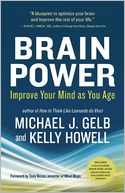 Brain Power: Improve Your Mind as You Age
Brain Power: Improve Your Mind as You Age
Brain Power presents practical, evidence-based information on improving your mind throughout life. Michael J. Gelb and Kelly Howell present an accessible and fun-to-read survey of the leading experts in the field of healthy aging, including physicians, gerontologists and neuroscientists. They′ve also studied the habits and practices of men and women who are paragons of healthy aging. Their approach isn’t just based on scientific theory and academic research. They actually apply everything they recommend in these pages and will guide you to apply these methods so that you will improve your mind every year of your life.
Order Here
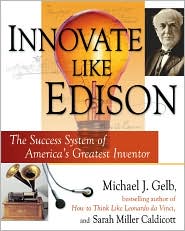 Innovate Like Edison
Innovate Like Edison
Innovate Like Edison presents Edison′s world-changing innovation methods as a cohesive, practical, and immediately applicable system. Based on three years of research, Innovate Like Edison offers readers an in-depth view of Edison′s comprehensive innovation approach - an analysis which has never previously been documented. Readers will learn to apply Edison′s Five Competencies of Innovation™ either to their work lives or their personal lives, following the timeless principles Edison used to generate his record-breaking 1,093 U.S. patents.
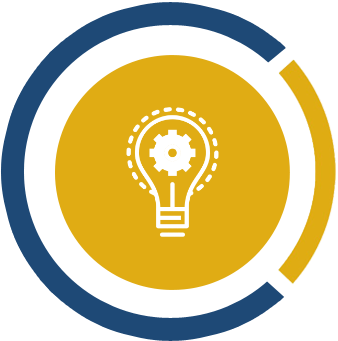
Michael Gelb discusses:

 VIDEO
VIDEO TESTIMONIALS
TESTIMONIALS PROGRAMS
PROGRAMS SPEAKING
SPEAKING BOOKS
BOOKS INTERVIEW
INTERVIEW